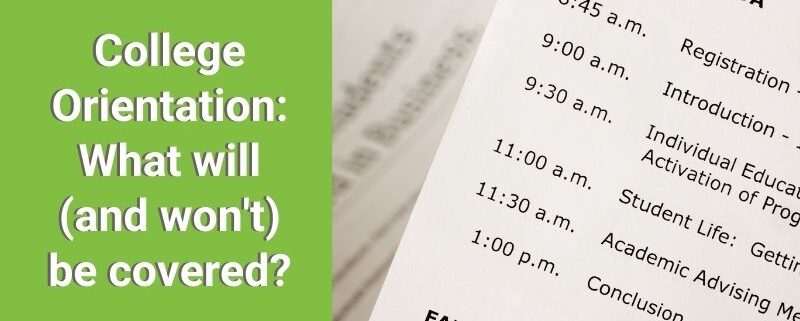What to expect at your student’s college orientation?
We love the high school graduation season and all that goes with it! Students have worked hard to get here. Families have spent the last year searching for, applying to, and choosing a college. Families tend to think, “We’re done!” and wait for the college orientation and the August drop off on campus.
However, much can be done between graduation and August to help your student make the most of their time at college. You aren’t done quite yet. 😊
College orientation is an important part of the preparation. But there are important topics that won’t be covered in those orientations. So, what will (and won’t) be covered in your college orientation?
What will be covered during college orientation?
Each college will approach orientation differently. Some are longer than others. We’re going to touch on common topics that they may cover to help you be prepared.
1) Getting to know campus
The college will make you feel welcome. It is exciting and fun! You might hear from important professionals on campus like your college’s dean or president. The mascot, cheerleaders, and/or band might make an appearance. You might get another tour of the campus. You’ll probably get your student ID.
Parents may be included, but they may not. If given the opportunity, students should stay overnight in a dorm room. Having that night away from parents is a important step.
Orientations may also include a club or organization fair. You’ll learn about school policies and rules. You might be invited to eat in the dining hall. The college may have social activities to get to know your fellow freshmen (although these might be put off until you arrive on campus in the fall).
2) Academic tasks
Often, the big task to accomplish at orientation is scheduling for the first semester of classes and learning to use the college’s system for doing that. Hopefully, you’ll meet your advisor. You might need to take placement exams to determine your readiness for certain courses. There may be steps to fulfill like providing your final transcript, sending your AP/IB exam scores, etc. You’ll want to learn about the academic calendar—start and end dates, how does add/drop work, what is the last date to withdraw from a course, etc.
3) Medical and financial topics
Families will probably hear about college-provided health insurance. (You’ll want to opt out if your student has insurance provided by you. Otherwise, the college will charge you for it.) Hopefully, they’ll point out the medical center.
The mechanical pieces of financial aid will be covered—how to pay your bill, what the timeline looks like, etc. They don’t want any confusion when it comes to getting paid, and they know you don’t want to miss an important deadline!
What might not be covered?
We love orientations. Take advantage of everything your college offers!
However, they can’t cover everything. They simply don’t have the time.
We know from personal and professional experience what won’t be covered. And the biggest missing piece—conversations between parents and students about the future on a whole host of topics!
What questions do you need to ask? What conversations do you need to have before students leave for their next adventure?
Topics for conversation should include:
- Academic – Talk now about preparing for a successful academic transition to college. Structurally, college is very different from high school.
- Career – Take the time to discuss how a student can leverage the years of college to be prepared for a career. Internships, co-ops, resumes, career research, job fairs, career services office.
- Adulting – So much to cover here! Organization, time management, safety precautions, and so much more.
- Financial – Planning a budget, who pays for what, how to pay for things, credit cards, meal plans, loans, scholarships.
- Health – How to handle when your child gets sick? What about insurance and prescriptions?
- Mental health – An important discussion for families to have! Staying balanced, staying in touch with each other.
- Shopping – Real tips for dorm room shopping, where to find student discounts, groceries.
- Social – Drinking, Greek organizations, being active, making friends.
- Legal – Your baby is now an adult. Discuss Title IX, consent, misconduct, drinking, etc.
- For parents – What are your biggest worries? Adjusting to an empty nest, staying in touch with your freshman (setting those expectations now), transitioning the support you provide to a new normal.
That’s a LOT! How do you get started?
Parents, you may know you need to talk about all these things with your child, but how do you even get started?!
Because we know how to frame the conversations families need to have on ALL those topics and more, we have created a custom Getting Ready for College eBook to get you started! It’s packed with 30+ pages of support and resources on the topics of: academics, experiential learning, careers, finances, health, safety, legal concerns, life balance, and social struggles. Our eBook includes checklists, shopping, and packing lists as well.
These important conversations need to happen. Our eBook can get those conversations rolling. We want everyone to move forward with increased confidence and preparation. And we are here to help.
Choosing the college was just the first step. You’re not done.
Get ready for your college orientation and be sure to have those conversations that won’t happen during orientation. The family connection will be special. You’ll be glad you did.
Enjoy this post? Don’t want to miss any future blogs about education, college, or careers?



